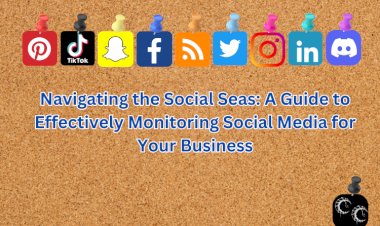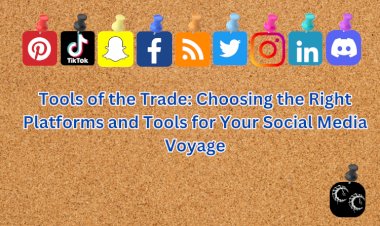How to Develop a Personal Brand

In today’s competitive professional world, developing a personal brand is essential for standing out in your industry and making a lasting impression. Whether you’re looking to advance in your career, build a network, or attract new opportunities, your personal brand is the key to showcasing your skills and defining your unique value. Here's a step-by-step guide on how to develop a personal brand that highlights your strengths and positions you as a standout candidate in your field.
1. Define Your Unique Value Proposition
Identify Your Strengths and Passions
Before you can build a personal brand, you need to understand who you are and what makes you unique. Start by reflecting on the following:
- What are your core strengths? Think about the skills that set you apart, whether they’re technical abilities, leadership qualities, or creative insights.
- What are your passions? Consider what excites you about your work or field. Passion is contagious and can be a powerful aspect of your brand.
Clarify Your Goals
Once you’ve identified your strengths and passions, align them with your career or business goals. Do you want to be seen as a thought leader in your industry? Are you looking to secure a promotion or job offer? Defining your goals will help you create a focused and purposeful personal brand.
Craft Your Unique Value Proposition (UVP)
Your UVP should answer the following questions:
- What value do you provide?
- How do you stand out from others in your field?
- Why should someone choose you over others?
Use these answers to create a short, compelling statement that communicates your unique strengths and value. This will be the foundation of your personal brand and help guide your actions moving forward.
2. Build Your Online Presence
Develop a Professional Website or Portfolio
Having an online presence is essential for today’s job market. A professional website or portfolio acts as a central hub where people can learn more about you, your work, and your expertise. Here’s what to include:
- Your biography: Share your background, expertise, and career highlights.
- Portfolio of work: Showcase examples of your work, whether it’s writing, design, projects, or achievements.
- Contact information: Make it easy for others to reach you for collaboration or career opportunities.
Optimize Your Social Media Profiles
Your social media profiles are extensions of your personal brand. Optimize them to reflect your professional identity:
- LinkedIn: Ensure your LinkedIn profile is fully updated with your experience, skills, and recommendations. Include a professional photo and customize your headline to reflect your value proposition.
- Twitter, Instagram, and Facebook: Choose platforms that align with your industry or goals. Share industry insights, articles, and personal achievements to establish your voice and expertise.
Create a Personal Blog or Content Hub
Creating valuable content is a great way to showcase your expertise. Start a blog or contribute articles to platforms like Medium or LinkedIn. Share your insights, research, and experiences to position yourself as an authority in your field. Not only will this help establish your knowledge, but it will also boost your online visibility.
3. Showcase Your Expertise
Share Your Knowledge
Building your personal brand isn’t just about self-promotion—it’s also about contributing to your industry. Here are a few ways to demonstrate your expertise:
- Write and publish articles: Share your perspectives on industry trends or offer tips and insights based on your experience.
- Public speaking: Speak at conferences, webinars, or industry events to showcase your knowledge and build your reputation.
- Collaborate with others: Partner with other thought leaders, influencers, or brands in your industry. This exposes you to a broader audience while adding credibility to your personal brand.
Seek Out Opportunities for Recognition
To boost your personal brand’s visibility, actively pursue recognition in your field. Some strategies include:
- Participating in awards or certifications: Earning recognition through industry awards or certifications can add credibility to your expertise.
- Getting testimonials: Ask for testimonials from colleagues, mentors, or clients who can vouch for your skills and impact.
4. Position Yourself as a Standout Candidate
Network and Build Relationships
Networking is a key component of personal branding. Cultivate relationships with colleagues, peers, mentors, and influencers in your industry. Attend conferences, workshops, or events to connect with others and build a strong support system. Engage on social media by commenting on posts, sharing others' work, and fostering conversations.
Tailor Your Personal Brand to Specific Opportunities
While your personal brand should reflect your overall values and goals, tailor your messaging to specific opportunities. If you’re seeking a job or freelance opportunities, highlight the skills and experiences most relevant to that role or industry. This ensures that you stand out as a candidate who brings the right mix of expertise and experience.
Show Consistency Across Platforms
Consistency is crucial to building a recognizable and trustworthy personal brand. Ensure that your messaging, visuals, and tone of voice align across all platforms. Whether someone comes across your website, LinkedIn, or social media profiles, they should be able to easily recognize your brand and understand what you stand for.
5. Continuously Evolve and Improve Your Brand
Stay Authentic and True to Yourself
A personal brand isn’t just about projecting an image; it’s about staying true to who you are. Ensure that your personal brand reflects your genuine self, including your values, passions, and strengths. Authenticity fosters trust and credibility with your audience.
Seek Feedback and Refine Your Brand
Your personal brand will evolve over time. Regularly seek feedback from colleagues, mentors, or your audience to learn what resonates with them and where you can improve. Use this feedback to adjust and refine your messaging, approach, and online presence.
Adapt to Industry Changes
Industries evolve, and so should your personal brand. Stay up-to-date with changes in your field and adapt your skills, content, and expertise accordingly. Show that you are forward-thinking and capable of adapting to new challenges.
Conclusion
Developing a personal brand is an ongoing process that requires intentionality, consistency, and authenticity. By defining your unique value proposition, building an online presence, showcasing your expertise, and positioning yourself effectively, you can create a personal brand that sets you apart as a standout candidate in your field. Keep evolving, stay authentic, and don’t forget to celebrate your progress along the way!






























